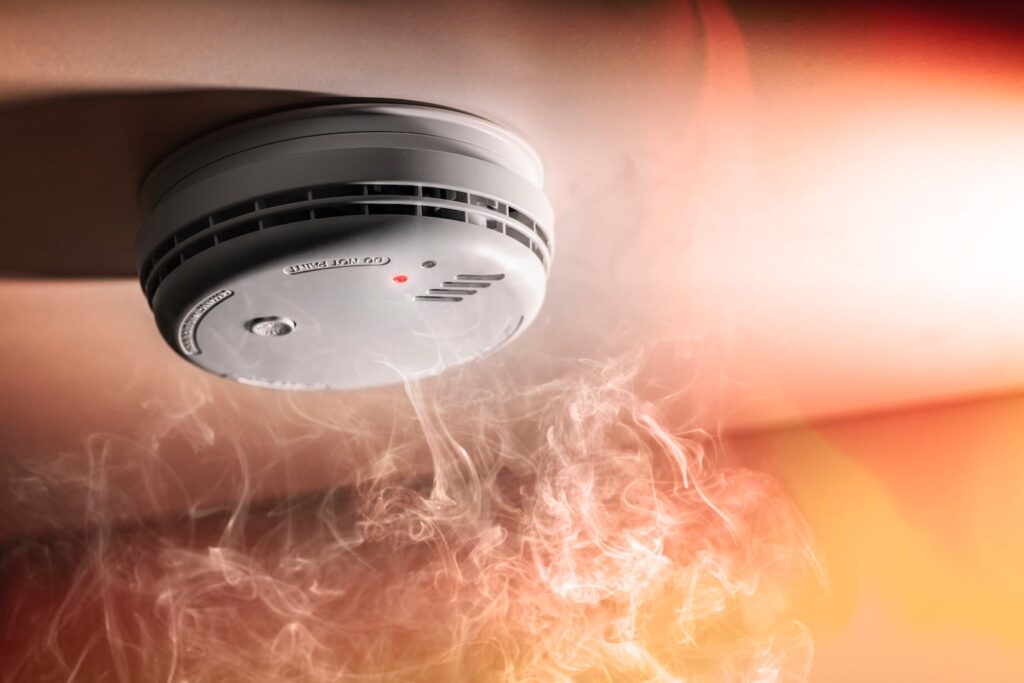
In addition to all other important steps toward safety, having a fire alarm system in your house must be one of them. Fire starts within seconds and spreads within minutes or so. The article will be dedicated to exploring the importance of fire alarms, their types, installation process, maintenance, and why using a high-quality system matters. Understanding each of the components that work together in the creation of a safer space will be quite important.
Understanding Home Fire Alarms’ Crucial Role in Home Safety
Fire alarms rank among the most important lifesaving devices at home. A simple smoke detector can make all the difference between life and death, warning you early enough of a fire to give those precious seconds to react. Why these alarms are so very important is discussed here.
Tragedy Prevention by Early Detection
A fire alarm is installed mainly to serve its purpose: the detection of smoke or heat, which means the birth of a fire. A fire doubles in size with every minute, and for this reason, early detection is very critical in the prevention of a small and manageable fire becoming a catastrophic one. The fire, especially when not noticed, may spread to other rooms or even the entire multi-story building, which can be much harder to handle. Early smoke detection provided by the alarms greatly lessens the chances of grave injury or death by offering precious time for the safe evacuation of the occupants.
Minimizing Property Damage
Among the major reasons for having fire alarms is to limit property damage. These early notifications can help contain a fire before it spreads throughout a house in case one occurs. Though fire departments respond as fast as they can, the damage that can be caused by an uncontrolled blaze is immense. Early notification allows the homeowner to act immediately, whether calling for help or activating other fire suppression systems, thus minimizing the extent of the damage.
Improving Peace of Mind
With fire alarms installed in every nook and corner of your house, it builds a safer environment. Peace of mind, knowing your loved ones are safe, is immense relief. You don’t have to stress too much about fire hazards since you are confident in your alarm system. Fire alarms reassure you that your home can respond to emergencies.
Choosing the Right Fire Alarm Systems for Your Home
Various factors make it key to take them into account when one seeks to buy a fire alarm system: the size of the apartment, its number of levels, the existence of small children and elderly or disabled individuals inside, and specific sources of fire within the household premises. It is pretty easy to notice here that different-sized houses, according to that, might have interlinked devices installed, if necessary, in each room for the large ones. Areas prone to higher fire risks include kitchens and garages; thus, they can be fitted with heat alarms.
It is crucial to ensure that fire alarms are sourced from companies that you trust for reliability. If you are in Belfast, you can have quality fire alarms supplied in Belfast. Such systems will come with your specific needs in mind, thus adequately equipping your house in case of fire hazards.
Type of Fire Alarms and Importance
Not all fire alarms are born the same. While all share the same basic principle, detecting smoke or heat, there are different types available; each offers certain benefits given certain situations. This part exposes the different types of fire alarms available and helps select one for your home.
Ionization Smoke Alarms
Ionization smoke alarms are those that have a high sensitivity to fast-flaming fires, producing little smoke with a lot of heat. The working of these smoke alarms is based on the ionization of air inside the sensor chamber and detecting a change in the ions when smoke particles interrupt this process. In these, paper, fabric, and flammable liquids cause fire. This kind of alarm is perfect for living rooms or near electric appliances where a fast flame could take place.
Photoelectric Smoke Alarms
Photoelectric alarms are good for detecting slow, smoldering fires that produce a lot of smoke. These fires usually are the ones that are hardest to detect at their onset and are ideal for areas where smoke is most expected to build up, like in the kitchen or near the fireplace. These detectors feature a light sensor that works by looking for changes in light scattering that occur when smoke comes into the chamber.
Combination Smoke and Carbon Monoxide Alarms
Many homeowners also prefer combination smoke and carbon monoxide alarms for increased safety. Carbon monoxide is an odorless, colorless gas that, if not detected, can be lethal. These alarms offer dual protection to make sure both the risks of fire and CO poisoning are at a minimum. This combination is especially useful in homes that have gas heating or appliances, as well as attached garages, where CO buildup can be a concern.
Heat Alarms
Unlike smoke detectors, heat alarms react to a change in temperature. Thus, they are ideal for the kitchen or garage, areas where normal smoke alarms may go off due to conditions other than a fire. These operate when the temperature of the atmosphere reaches a high value, usually 135°F (57°C), thus providing more reliable warnings in an environment where smoke is present but a fire is not imminent.
Smart Fire Alarms
In the time of smart technology, smart fire alarms are gaining rapid momentum. These connect to your Wi-Fi network and send alerts on your smartphone when you may not be around. The models integrate with smart home systems, therefore allowing automation like the sprinkler turning on or opening windows to help contain the fire. They have added convenience and safety by letting people know in real time where an emergency is occurring.
Installing Fire Alarms: A Step-by-Step Guide
Installation is an integral part of the effective functionality of fire alarms. Whether one installs them himself or seeks the services of professionals, knowing the installation process ensures that your fire alarm system works as it should. The following are the major steps one should follow when installing fire alarms in your house.
Choosing the Right Locations
One of the most important areas of fire alarm installation is proper location. Place fire alarms on every floor of the home, inside each bedroom, and outside each sleeping area. In multilevel homes, alarms should be placed at the top of each staircase to help ensure all areas of the home are protected. Avoid installing alarms near windows, vents, or air ducts because drafts can interfere with their ability to detect smoke.
For kitchens, it is always advisable to install heat detectors rather than smoke alarms to avoid fake alarms due to cooking smoke. In areas like the attic or basement, where there is less probability of smoke, select those alarms that are less sensitive to dust yet can detect dangerous fire hazards.
Professional vs. DIY Installation
While it is possible to install smoke alarms yourself, having professionals will ensure they are placed appropriately and per local building code. It’s particularly more convenient in the case of an interlinked system wherein the activation of one alarm initiates the triggering of all alarms inside the house. In fact, such an interconnected configuration has great importance because everyone may be warned without minding which part of the house they are staying in.
Operating and Maintaining Your Fire Alarm System: Ensuring It Works
Owning a fire alarm system is only half the battle, but keeping it maintained is another very important half. Regular upkeep is important, as it includes having the alarm ready any moment it is needed to detect smoke or heat. Here’s how to maintain your fire alarm system properly.
Monthly Testing
You should test your smoke alarms at least once a month. The testing process is straightforward and won’t take more than a few minutes. To test your fire alarm, simply press its test button until the device makes a loud sound. Replace immediately if the alarm does not emit a sound.
Changing Batteries
If your smoke alarm is battery-powered, replace the batteries at least once each year or when the low-battery warning starts to sound. Newer models have been fitted with long-life batteries, some lasting up to 10 years. After that time, either the battery or the whole unit may need replacement.
Regular Cleaning
Dust and dirt build-up in fire alarms can also reduce their sensitivity. Regular cleaning by a vacuum cleaner or a soft-bristled brush should be done to ensure sensors are free from particles that may interfere with correct detection.
Replacing Fire Alarms
Most fire alarms tend to serve for 10 years. Beyond this period, the sensitivity of the alarm diminishes and might not work as anticipated. Ensure that your fire alarms are replaced at the recommended interval to maximize safety in your home.
Conclusion: The Importance of Investing in Quality Fire Alarms
Investment in good-quality fire alarms is an upfront investment in the protection of one’s family. Though the cost initially seems high, it is, in fact, a small price to pay compared to the value provided by these lifesaving devices. From early detection of fire incidents to reducing the possibility of severe property damage, fire alarms are indispensable for saving your home. For people residing in Belfast, one should consider fire alarms supplied in Belfast to ensure your house is equipped with high-quality systems that offer peace of mind and reliability.
The selection and identification of various types of fire alarms, the installation, maintenance, and choice of a system appropriate for one’s house would, therefore, represent all necessary steps towards further enhancing one’s house with respect to fire safety. Keep carrying on the routine check-ups on the fire alarm system in your house; change old units and add new ones in areas needing them.








